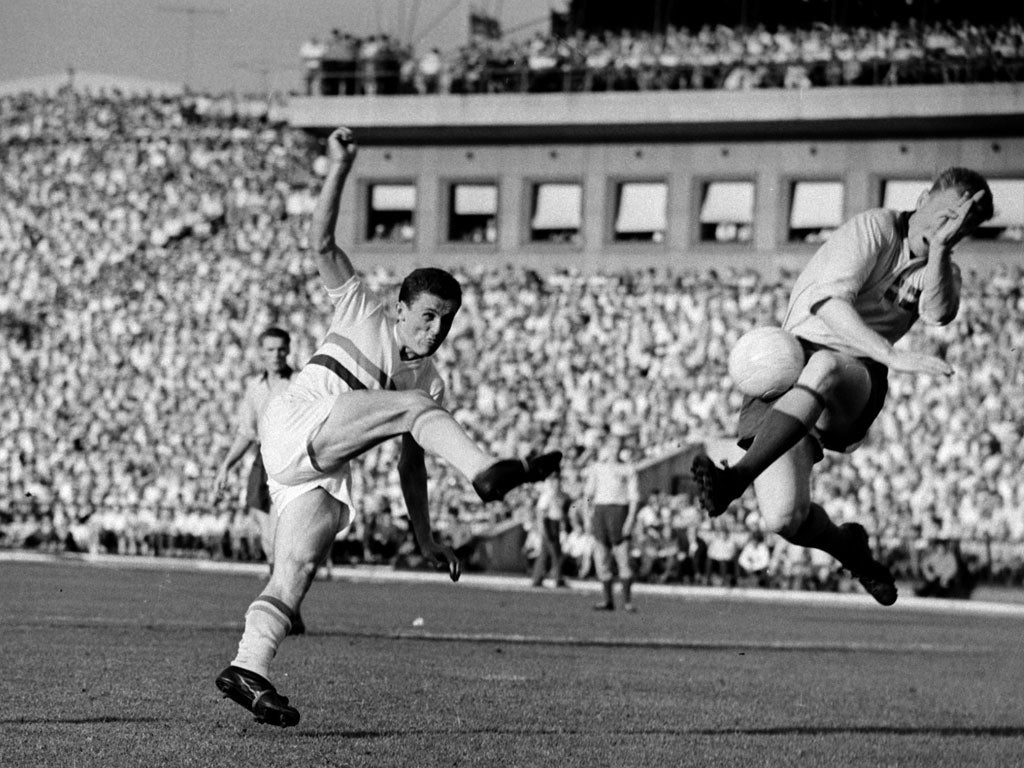Florian Albert: Footballer whose stylish talents lit up grounds around the world

Florian Albert, the 1967 European Footballer of the Year, was a sporting aristocrat. Not by any mere accident of lineage – he was born the son of a farmer/blacksmith on the Hungarian side of the border with the former Yugoslavia – but by dint of a decade and a half of oozing style and elegance in the shirts of his sole club, Ferencvaros, and his country, where they know a thing or two about exceptional players.
Albert grew up idolising Ferenc Puskas, the unarguable star of the Magyars who taught England a thing or two about the game by annihilating them twice in the early 1950s, yet he became more naturally the heir of the Galloping Major's infinitely subtle team-mate, Nandor Hidegkuti. As England's finest were put to the sword so ruthlessly it was the deep-lying centre-forward Hidegkuti who pulled the strings, and later Albert would succeed him as a goal-scoring schemer sublime.
The younger man, who scored 32 times in 75 internationals from 1959-74 and created countless chances for the likes of Lajos Tichy, then later Ferenc Bene, was a destructive attacking wanderer capable of dictating the tempo of play. His technique was exquisite, the accuracy of his passing was matched by its intelligence, he could shoot ferociously with either foot, he dribbled divinely and was a shrewd tactician.
His temperament was not perfect. There were days when, perhaps exasperated by the attentions of a close marker, he could appear moody, drifting on the fringe of the action. Then his deceptively languid gait could give the false impression that he didn't care – but when he dominated a contest, he offered unalloyed delight.
Albert, who lost his mother when he was two, then moved to Budapest, was outstanding from boyhood and was associated with Ferencvaros, the capital's most successful club, from the age of 11. He played for Hungary's junior team on his 16th birthday, made his senior debut for Ferencvaros a year later and earning his first full cap in a 3-2 victory over Sweden a week after completing his school exams in 1959.
Soon Albert became an irresistible force, helping to win the title in 1963, '64, '67 and '68 and the main domestic knock-out competition in 1972, and topping the national scoring charts in three seasons. In 1964-65 he shone as the Green Eagles beat Juventus in the final of the Inter-Cities Fairs Cup, having disposed of Manchester United over three games in a replayed semi-final.
Internationally, he was a colossal achiever, a central figure in Hungary's rebuilding after an exodus of leading players in the wake of the uprising of 1956. He collected a bronze medal at the Rome Olympics in 1960, and with four goals he was joint top scorer as the Magyars reached the World Cup quarter-finals in Chile in 1962. He touched his most opulent form when Hungary reached the last eight again in England in 1966, and he was influential as his country finished third in the European Nations Cup in 1964 and fourth in 1972.
Albert is best remembered in England for his sumptuous display in the 3-1 beating of champions Brazil in a group match at Everton in July 1966. On a sodden Merseyside afternoon, the tall, slim play-maker glittered, playing a part in all three goals, most unforgettably in the second, when he freed Bene to set up Janos Farkas for a savage volley. The local fans chanted "Albert, Albert" as he walked off at the end.
In recognition of his sustained splendour, he beat the holder, Bobby Charlton, to the Ballon d'Or of 1967, and remains Hungary's only winner. He retired in 1974 after scoring more than 250 goals in around 350 league games for Ferencvaros, and in 2007 the club named their stadium after him.
After his playing days he managed Al-Ahly Benghazi in Libya then returned to Ferencvaros in several capacities, including technical director. His son, Florian Jnr, also played for Ferencvaros and Hungary. Albert died of complications three days after heart surgery.
Florian Albert, footballer: born Hercegszanto, Hungary 15 September 1941; played for Ferencvaros 1958-74; capped 75 times by Hungary 1959-74; married (one son, one daughter); died Budapest 31 October 2011.
Join our commenting forum
Join thought-provoking conversations, follow other Independent readers and see their replies
Comments